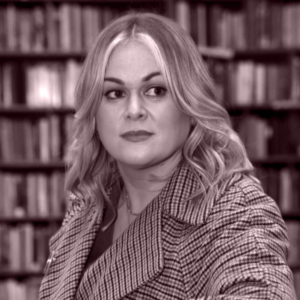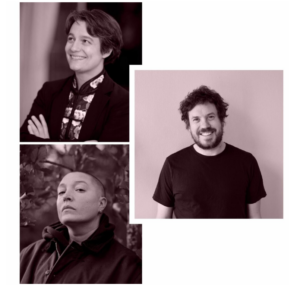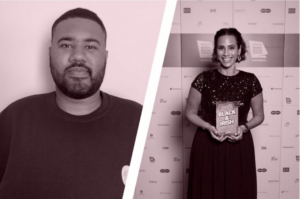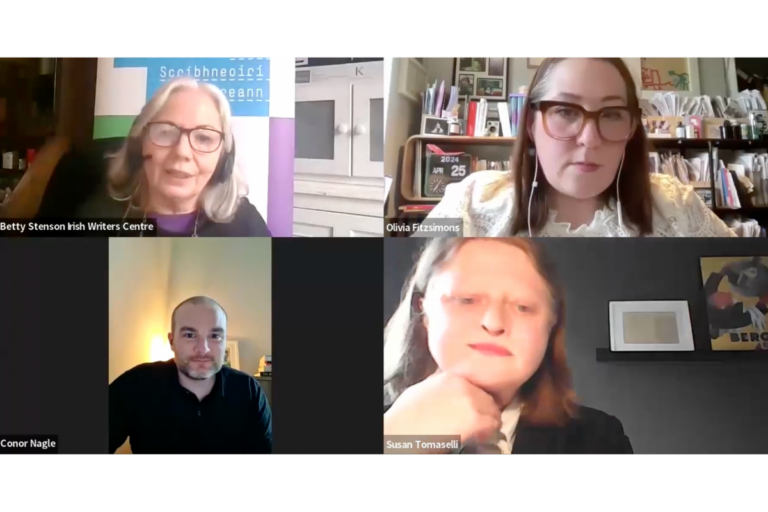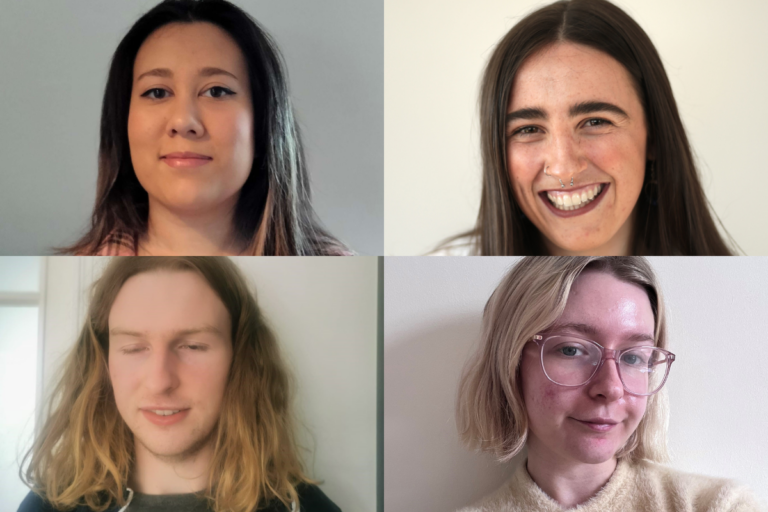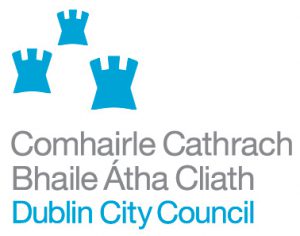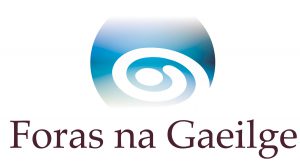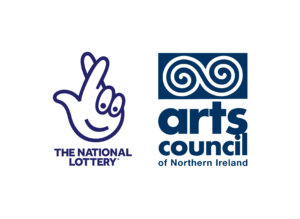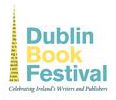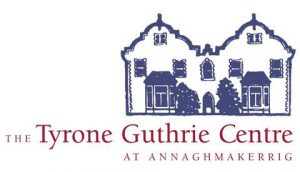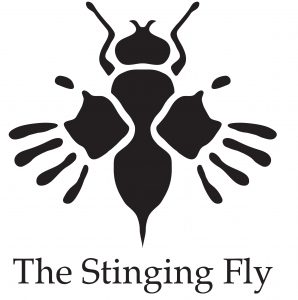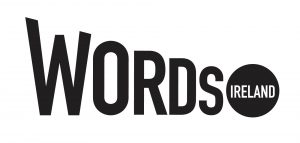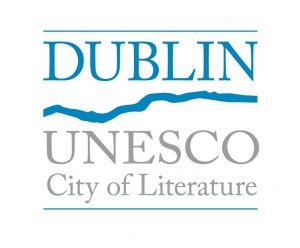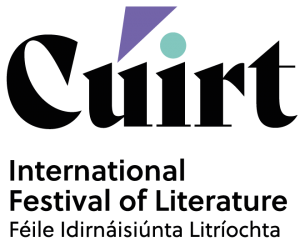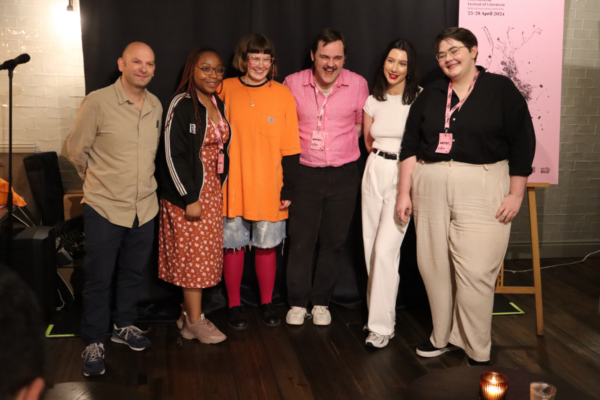
08 May, 2024
Our Young Writer Delegates look back on Cúirt 2024
Last month, writers, readers and book-lovers from far and wide travelled to Galway for the Cúirt International Festival of Literature 2024. From 23-28 April, attendees were treated to a week full of readings, conversations, film screenings, walking tours, events and special guests, which showcased new voices, diverse writing, Irish and international writing talent.
Among the attendees were our IWC/Cúirt Young Writer Delegates, Ciara Broderick, S.J. Delaney, Mars Duignan, Queen Madunwe and Emma Quin. As part of the festival our Young Writer Delegates took part in their very own showcase event where they got the chance to perform some of their work to a packed audience in The Hardiman. Their local writer-mentor Alan McMonagle was in attendance along with last year’s IWC Cúirt Young Writer Delegates who turned up to show their support as well!
Each year, the delegates attend events of their choice and write a review of their experience; here are the reviews our delegates wrote up for Cúirt 2024!
Elaine Feeney Headshot, Cúirt 2024
Elaine Feeney Launch: All The Good Things You Deserve – Reviewed by Ciara Broderick
Arriving at the launch of Elaine Feeney’s new poetry collection All Good Things You Deserve the excitement was immediately clear. Not only was the Mick Lally packed to the rafters, it was also abuzz in a way no event had been so far. As soon as Elaine and her moderator, the ever-amazing Susannah Dickey, took to the stage, it was obvious why.
Dressed in a stunning black velvet suit, Elaine opened with the titular poem in her collection. Over 24 expertly crafted cantos, she revealed to us the story of a young girl’s rape at the hands of someone she knew socially. The poem is harrowing, raw, honest and completely compelling, and perfectly set the tone for the rest of the evening.
Given the subject matter, it would be easy to expect the discussion that followed the reading to not be for the faint of heart. And while, yes, Elaine’s discussions of the attack referenced in the poem, as well as another serious physical assault that happened around the same time, were heartbreaking, the genuine warmth and affection between her and Susannah elevated it to so much more. Elaine was wonderfully witty and genuine and her willingness to be vulnerable and more importantly, angry, will stay with me for a long time. The exploration of how the legal systems treat survivors of violence was insightful and deftly handled. Elaine revealed how, to her, poetry is the perfect medium to explore those experiences as it is the only form in which one does not have to “defend the narrative”. As she put it, in poetry you can simply say “I just fucking felt that way.” Truly a mantra for writing and for life.
The evening ended with a more tender poem, a love poem written for Elaine’s husband. Much to his embarrassment, apparently. Overall my favourite event of the festival. Be sure and catch Elaine Feeney in conversation any chance you can.
Katriona O’Sullivan and Kieran Yates: Homeplace – Reviewed by Ciara Broderick
Every time I told someone I would be going to see Katriona O’Sullivan at the Taidbhearc, they all said the same thing: “Oh God, she’ll be brilliant.” Having done the media rounds O’Sullivan has cemented herself as a powerful speaker with a lot to say, and she did not disappoint. Kieran Yates, a journalist and writer I was unfamiliar with before now, was also a revelation.
Framed as a discussion about the importance of “home” this talk was more a deep dive into the political and sociological failings that leave many excluded from secure accommodation, and therefore many other aspects of “normal” society. Katriona spoke evocatively of her origins, growing up in a disadvantaged home with parents experiencing substance use issues and how that led to her becoming homeless and pregnant as a young teen. Kieran, who also grew up in a disadvantaged area with a single mother, spoke of the experiences young people nowadays have within the housing market, essentially having to perform and sell themselves just for the basic human right of shelter.
Both speakers, through their passion and insight, essentially evoked a call to arms regarding the state of our current housing markets and society at large. As someone who works within the homeless sector, supporting people living with the implications of the issues raised by Katriona and Kieran, it was a timely re-injection of empathy and righteous anger at the state of our world. Both Katriona’s Poor and Kierans’s All the Houses I’ve Ever Lived In are required reading.
Debut Novels: K Patrick and Nicola Dinan – Reviewed by Ciara Broderick
Having missed the other “debut novels” event with Colin Walsh and Ferdia Lennon, I was very excited to catch this talk regarding K and Nicola’s experience of first-time novel publication. Both writers took very different routes to their first novels. K is an established poet while Nicola, by her own admission, started writing short stories that nobody wanted to publish before jumping into a full length work.
The talk, as a result, focused far more on the process of creating than the business of publishing, and explored topics such as inspiration, perspective and conveying queer and trans experiences on paper. While the conversation itself was incredibly insightful, the easy back-and-forth between K and Nicola made it feel like a chat over coffee with friends as much as a discussion on debut novels. Followed up with very interesting questions on representation within the publishing/book marketing industry that surely a whole festival could be dedicated to answering.
Headshots: Joey Connolly, Abigail Parry and K Patrick, Cúirt 2024
Poetry Reading: Joey Conolly, Abigail Parry and K Patrick – Reviewed by Mars Duignan
From the moment I saw the Cúirt programme, I had been looking forward to the Saturday evening line up. An Taibhdhearc hosted Susannah Dickey and Mark O’Connell discussing their books and broader ideas on how we approach crime, criminals, and victims; as well as the author’s role: adjacent or antithetical to the true crime cycle. Followed by a short, sunny walk back to the Mick Lally theatre which had become a makeshift home for avid festival- goers for a touching and life affirming glimpse into the dynamics between gay men and lesbians during the AIDS crisis, details about lesbian experience in America, canvassing during the marriage referendum and the relationships that ebb and flow throughout a lifetime. Either of which could have been a worthy topic for review, however as a poet I am biased.
The poetry reading programme of Cúirt this year, slightly different to the panels which facilitated questions about ideas and form, these events consisted of each poet standing for 20 minutes and reading a selection of their work. While myself and my pocketbook had found that through the week it was nearly impossible not to be charmed by an author reading their own work in their natural tone and cadence, this was especially effective when the writer tells an improvised short story through their work. Each reading becoming a little verbally annotated collection, giving each poem a context, history, and more often than not a note of affection. Poetry readings are one of the best ways to demystify the craft and subject through sheer good fun.
The poetry reading from Joey Connolly, Abigail Parry and K Patrick was spellbinding. It had a lot going for it, in addition to the speakers themselves. It was on at 9.00pm – which the steady conditioning of open mic nights informs me that that is the best time for poetry. There was something about entering this grand limestone chamber at a reasonable time with daylight to spare, listening to some fine contemporary poetry and emerging out into the night a little drunk on the sum of the day’s experiences.
K Patrick began the reading from their book Three Births, reading about David Attenborough, love of and in masculinity and the formation of a self. Inspiring a feeling that you could very easily find yourself on the other side of a nature documentary, something that is very current for queer people the world over. Their poems insisting on tangible organs that rooted them in a physical realm that cemented ideas about gender that can feel ephemeral to some – after all what’s more natural than a birth? Or three?
Joey Connolly brought an ease to his reading, from multiple collections, that comes from a well-versed performance. During one poem, he enlisted K Patrick to read another at the same time, blurring the boundaries between the pieces and lending an air of being in the room where interesting things where things happen. He finished with a triumphant rendition of a poem born of playful spite written entirely from a new format of LOL.
Abigail Parry finished the night out with poems that each presented a new rabbit hole to fall into. She produced for her first trick, maritime flags denoting symbols sent by passing ships to one and then another , with a flourish. Engaging with the room the way a lecturer might with a class there was a moment I genuinely believed we were about to confronted with a speculum. Parry’s poems are current, with references to popular culture and an overarching exploration of intimacy that quickly translated onto the audience. The poems were vivid, interesting, and rhythmic in a way that marched us out of the Mick Lally onto the waiting streets of Galway (after a quick book signing, of course).
The event, in sum, was intimate and interactive on the part of the audience and performers. What a pleasure to walk into a room of strangers, and leave as a part of a group with signed copies of new favoured poet’s books.
Headshots: Leon Diop and Briana Fitzsimons, Cúirt 2024
Black & Irish: Legends, Trailblazers & Everyday Heroes – Reviewed by Queen Madunwe
“We believe if you don’t write your own story, then someone else will write it for you. We want to own the narrative around the formation of the Black Irish identity.”
On the afternoon of the 27th of April, the second last day of the Cúirt Festival I was running to catch the Black and Irish event at the Town Hall Theatre in Galway. Black & Irish: Legends, Trailblazers & Everyday Heroes is a publication aimed to celebrate the Black Irish Identity. It features profiles of Black Irish public figures from the worlds of pop culture, politics, sport, business and the arts. It is published in collaboration with the Black Irish organisation.
The trio’s conversation on the Black Irish experience is something that I found particularly interesting. They briefly read from the introduction of the book and talked about how being Black and Irish is not a new thing but has actually been present in Ireland for centuries.
They discussed on how they went about promoting the book in schools. They took to Twitter to offer schools the opportunity to receive copies of the book. Somehow the far-right got a hold of it and were outraged but thanks to the controversy, the book blew up even more!
What really struck a chord with me was when they talked about the naming of their organisation. Why they chose “black” instead of something like “Afro-Caribbean”. They wanted it to be more inclusive and universal.
After the event, I chatted with them about how they feel about people who are not black writing about the black experience, and they had differing but very insightful opinions about it.
The epigraph is from the book’s introduction. It made me think of the question, who takes ownership of the narrative? It speaks to the importance of individuals shaping their own stories rather than allowing others to misrepresent them. This reverberates the thought of people writing about an ethnicity different from their own.
On one hand, I believe that authentic representation comes from lived experience. Those who have directly experienced the nuances and complexities of being black are best positioned to articulate those experiences accurately. This perspective argues that outsiders may not fully grasp the intricacies and nuances of the black experience, potentially leading to misinterpretations or perpetuation of stereotypes.
However, I believe that storytelling is inherently about empathy, creativity and imagination. While lived experience certainly brings depth and authenticity, it doesn’t necessarily preclude people from writing about experiences differing from their own. In fact, engaging with diverse perspectives can enrich and broaden the portrayal of differing narratives. Through research, empathy, and collaboration, anyone can contribute valuable insights and perspectives to the conversation.
Choose the Box That Applies: Irish or Nigerian
Dia dhuit.
One of the few words I know in Irish.
Kedu.
One of the few words I know in Igbo.
Both of those words mean hello.
Conas ata tu?
Kedu?
Is maith liom uachtar reoite.
Shebapuo.
Not Irish enough, not Nigerian too,
A feeling of being lost in between the two.
How can I be one but not the other.
Be both but neither.
When I am too black for one
And too oyingbo for the other.
I don’t think I will ever find my place,
A space where I can be both without being chased.
I may not fit into a neat little box,
But I’m proud of my mixed heritage
and all that it unlocks.
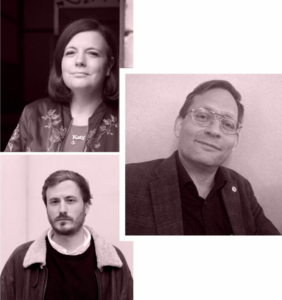
Headshots: Clemens Meyer, Katy Derbyshire, and Jacques Testard, Cúirt 2024
Frames of Reference: Translation – Reviewed by Emma Quin
Discussing the mysterious art of translation was an incredible way to start a Thursday morning at Cúirt 2024. Titled Frames of Reference: Translation, with German author; Clemens Meyer, esteemed translator; Katy Derbyshire, and Fitzcarraldo Editions founder; Jacques Testard, we dove deep into all things translation. Hearing the author, publisher and translator’s perspectives together, helped me understand the breadth of work entailed in bringing a piece of writing into a different language. With every language having its own grammatical rules and structure, we discussed how translators must at times change a piece of writing to ensure the original meaning stays intact. Understanding translating as a holistic art form that requires a deep knowledge of linguistic context, not simply just a moving of words into a different language, helped me understand the tremendous skill involved in translation. To know another language and the culture it is born from as intimately as your native language, requires a kind of brain power I certainly do not have, but deeply respect. I am so thankful to the work of publishing houses like Fitzcarraldo Editions and translators like Katy Derbyshire, who work tirelessly to bring new writing to new audiences. Overall, throughout the discussion I couldn’t help but be truly in awe of language, and our ability to communicate with one another. This feeling inspired me to write a short poem.
Talk to me
My hardened tongue
Has lacerated many letterings
Splurging from body
mind
mouth
Onto kitchen floors and patterned tablecloths
at reasonably-priced restaurants
Yet my organs lurch in love
When moving mouths
Strengthened in regional muscle
Uplift in their corners
Baring depleted enamel
I am made ecstatic
by human understanding

